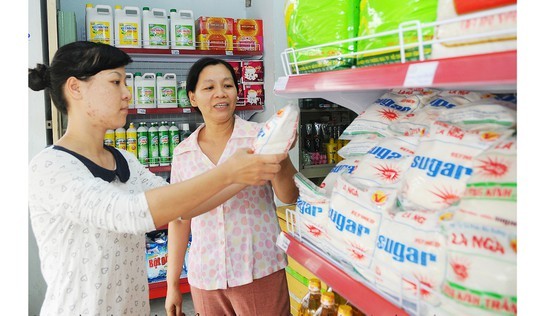 Customers buy sugar at a supermarket in Hoc Mon District in Ho Chi Minh City. (Photo: SGGP)
Customers buy sugar at a supermarket in Hoc Mon District in Ho Chi Minh City. (Photo: SGGP)
Avoiding repeating the same mistakes
The Ministry of Industry and Trade (MoIT) has just consulted a draft circular guiding some articles on safeguard measures in the EVFTA. This circular will guide the application of safeguard measures in the transition period and the anti-dumping and anti-subsidy measures for the implementation of the EVFTA.
This is considered as important information, helping to create a "shield" for enterprises to protect their legitimate interests when the country integrates into the global economy, to prevent them from making the same mistakes as many industries recently, which have had to be at a disadvantage right on the home ground.
The latest loss is in the sugar industry. Since the removal of tariff quotas among countries in the ASEAN, the total amount of cane sugar imported into Vietnam has increased rapidly. In the first seven months of this year, the amount of imported sugar reached nearly 820,000 tons, nearly seven times higher than that in the same period last year. Of which, the amount of cane sugar imported from Thailand accounted for nearly 92 percent of the total amount of cane sugar imported into Vietnam.
Therefore, the MoIT decided to initiate an anti-dumping and anti-subsidy investigation on cane sugar originating from Thailand. However, many domestic enterprises said that some enterprises probably imported raw sugar from Thailand to Laos and Cambodia for refining, then exported to Vietnam to evade trade remedies. Therefore, in the context of Vietnam participating in a larger and harsher "playground" like the EVFTA, Vietnamese enterprises need to be protected, and enterprises need to take measures to protect themselves.
In fact, the mechanism for conducting trade remedies under the EVFTA already exists, but the problem is that whether enterprises and associations can actively grasp and understand the regulations to apply or not. Many enterprises even have not been aware of the importance of using safeguard measures to protect their legitimate interests.
Therefore, enterprises need to actively capture information about manifestations of commercial frauds in their fields and coordinate with authorities to analyze and evaluate the impacts, thereby, together with authorities to launch investigations or apply safeguard measures to protect the development of domestic manufacturing industries.
Increasing quality competition
The results of a recent survey shared by the Trade Remedies Authority of Vietnam are noteworthy. The survey shows that about 15 percent of enterprises do not know anything about trade remedies, while only nearly 2 percent have studied relatively carefully, and most enterprises have heard about trade remedies but have not understood this matter. Even there was a company being initiated a trade remedies investigation, but it did not know that.
In the first half of this year, the MoIT was monitoring 13 trade remedies investigations initiated by foreign countries on Vietnamese goods and six cases that are likely to be investigated in the coming time, much more than the number of trade remedies investigation of the whole year of 2019. Noticeably, the level of investigation on wooden products tends to increase with seven cases, accounting for 4 percent. Meanwhile, in the whole period from 2007 to 2017, there were only three trade remedies investigations on wooden products.
Vietnam participates in more and more FTAs and integrates deeply into the global economy, which means that the risk of Vietnamese enterprises involved in trade remedies lawsuits is also higher. Being sued, or even imposed taxes, and the loss is not only suffered by a few specific enterprises, but more importantly, it also affects the prestige of the product categories, and even hinders Vietnamese goods when exporting to markets that have not been levied taxes.
Some economists said that to minimize the possibility of being applied safeguard measures, one of the factors for enterprises to minimize the impacts of trade remedies is to develop value chains, develop domestic raw material resources, build an export strategy in the direction of diversifying markets, enhance competition by quality and limit price competition, and consider trade remedies as a part that needs preparation in production and business strategy.
Besides focusing on in-depth development (increasing domestic added-value), relevant authorities, particularly the MoIT, need to monitor carefully to give early warning if products exported to some markets showed a sudden increase.
Relevant authorities need to strengthen the unified, throughout coordination mechanism in handling trade remedies cases between central ministries and provinces, between domestic and foreign agencies, and between State management agencies and associations, and complete the connection of the customs database with the trade remedies database to serve the investigation, application, and response to trade remedies cases.
Besides improving their understanding to protect themselves, enterprises must also be determined not to abet the act of origin fraud, at the same time, actively coordinate with competent authorities to investigate, prevent, and avoid letting the act of living from hand to mouth of a few enterprises affect many genuine manufacturing and trading enterprises.
To protect the domestic market, Vietnam has also launched 19 trade remedies investigations. The products investigated and applied import tariffs are relatively diverse, from raw materials, such as steel, metals, chemicals, plastics, and fertilizers, to consumer goods, such as Monosodium glutamate and sugar. Thanks to safeguards, many enterprises in some economic sectors have significantly improved their production and business situation, avoided losses, and gradually stabilized their production.
























